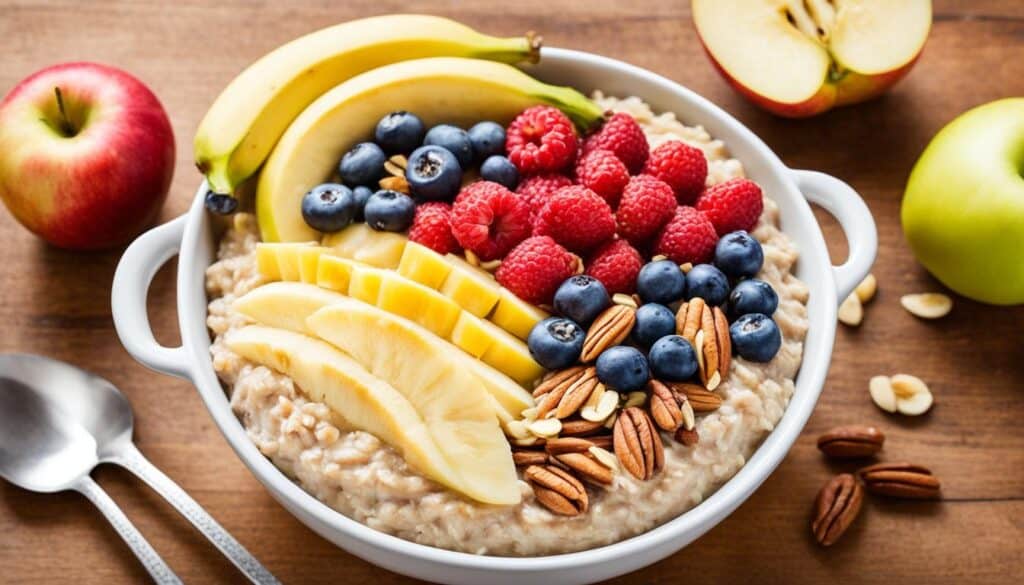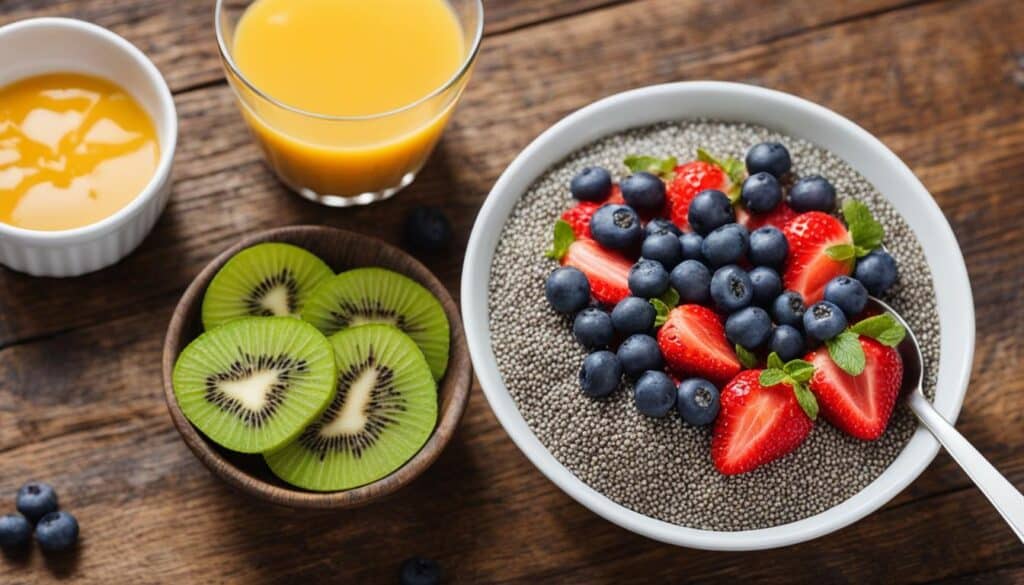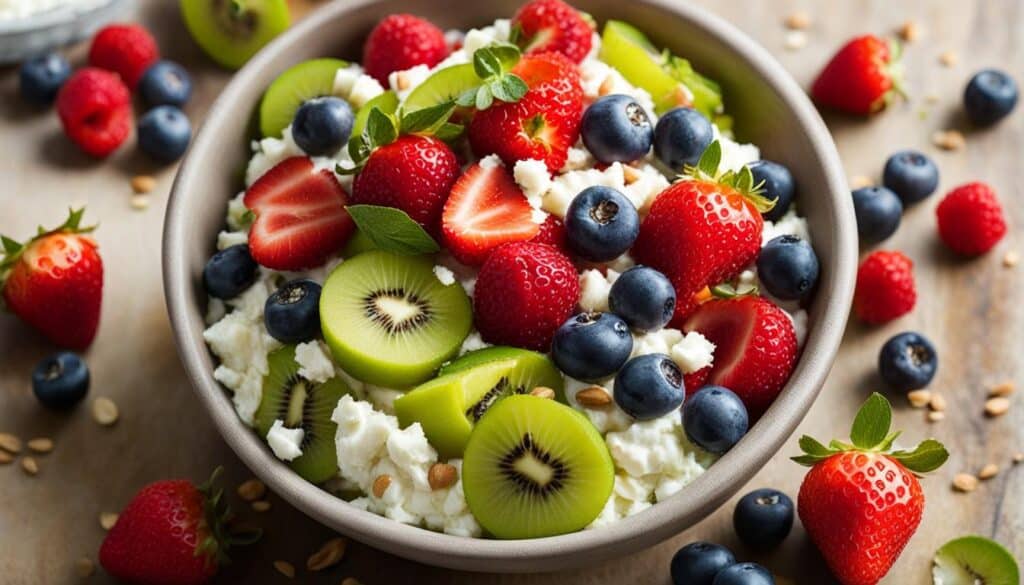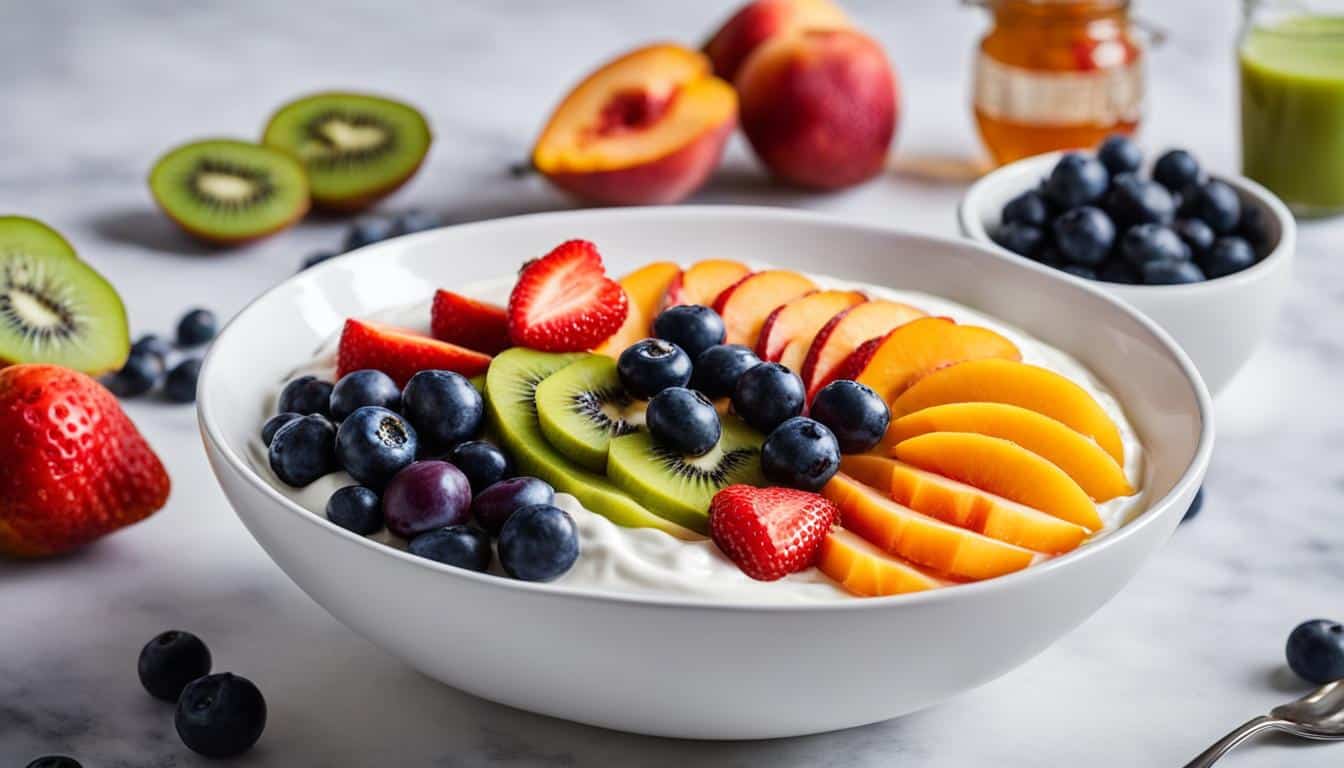Are you looking for a healthy and delicious way to start your day? Incorporating fruits into your breakfast can be a great choice! Not only are fruits packed with essential vitamins, minerals, and antioxidants, but they also provide a natural sweetness that can satisfy your cravings and keep you energized throughout the morning.
When it comes to choosing fruits for breakfast, the options are endless. From refreshing berries to tropical favorites like mangoes and pineapples, there’s a fruit out there to suit everyone’s taste buds. But which fruits are the best for breakfast?
Key Takeaways
- Including fruits in your breakfast can provide essential vitamins, minerals, and antioxidants.
- Fruits add a natural sweetness and flavor to your morning meal.
- Berries, such as blueberries and strawberries, are excellent choices due to their high antioxidant content.
- Tropical fruits like mangoes and pineapples offer a refreshing and tropical twist to your breakfast routine.
- Experiment with different fruit combinations to keep your breakfast exciting and flavorful.
Eggs
Eggs are a simple and nutritious choice for breakfast. They are a great source of protein, which is essential for muscle growth and maintenance. Eggs can also promote a feeling of fullness and reduce hunger later in the day. Additionally, eggs contain lutein and zeaxanthin, which support eye health, as well as choline, B vitamins, vitamin A, iron, calcium, and other essential minerals. Contrary to previous beliefs, eggs do not significantly raise cholesterol levels in most people and may even have a protective effect against heart disease.
Include eggs as part of your breakfast to reap their nutritional benefits. They are versatile and can be prepared in various ways, such as scrambled, boiled, or as part of a delicious omelet. Not only do eggs provide a substantial amount of protein, but they also offer a wide range of vitamins and minerals that contribute to your overall health and well-being.
Protein in Eggs:
Eggs are an excellent source of high-quality protein. Protein is essential for growth, repair, and maintenance of tissues, including muscles, hair, skin, and nails. It also plays a vital role in hormone production, enzyme function, and immune system support. Consuming protein-rich foods like eggs for breakfast can help you stay satiated and energized throughout the day.
Nutritional Benefits of Eggs:
Eggs provide a variety of essential nutrients that contribute to your overall health. Here are some key nutritional benefits of eggs:
- Eggs are a good source of vitamins such as vitamin A, vitamin B12, vitamin D, and vitamin E, which are essential for various bodily functions. Vitamin A promotes healthy vision, vitamin B12 supports nerve function, vitamin D aids in calcium absorption for strong bones, and vitamin E acts as an antioxidant to protect cells from damage.
- Eggs are rich in minerals such as iron, calcium, phosphorus, and selenium, which are important for maintaining healthy bones, teeth, and blood cells. Iron is necessary for oxygen transport in the body, calcium supports bone density, phosphorus contributes to energy metabolism, and selenium acts as an antioxidant and plays a role in thyroid function.
- Choline is another valuable nutrient found in eggs. It is essential for brain development, memory function, and liver health. It also aids in the synthesis of DNA, cell membrane structure, and the neurotransmitter acetylcholine, which is involved in muscle control and memory.
When consuming eggs for breakfast, aim to include the whole egg, as both the egg white and yolk contain valuable nutrients. However, if you have specific dietary restrictions or concerns, such as cholesterol or egg allergies, it’s important to consult with a healthcare professional for personalized advice.
“Eggs are not only delicious, but they also provide a rich array of nutrients that support overall health and wellbeing.” – Dr. Jane Smith, Registered Dietitian
Incorporating Eggs into Your Breakfast:
There are numerous ways to incorporate eggs into your breakfast routine. Here are some ideas:
- Enjoy a classic scrambled eggs and toast combo, seasoned with herbs and spices.
- Prepare a vegetable-loaded omelet with your favorite ingredients, such as spinach, mushrooms, and tomatoes.
- Boil a few eggs in advance for convenient grab-and-go breakfast options.
- Create a nutritious egg salad sandwich using whole grain bread and a light mayo or Greek yogurt-based dressing.
Remember to cook eggs thoroughly to ensure food safety and minimize the risk of foodborne illnesses. Enjoy the versatility and nutritional benefits of eggs to start your day off right.
Greek Yogurt
Greek yogurt is a delicious and nutritious option for breakfast. It is higher in protein and lower in calories compared to regular yogurt, making it a filling and satisfying choice to start your day. A 1-cup serving of Greek yogurt provides approximately 25 grams of protein, which is beneficial for muscle growth and repair.
Not only is Greek yogurt rich in protein, but it also contains essential nutrients like calcium, vitamin B12, zinc, and potassium. These nutrients play crucial roles in various bodily functions, such as bone health, energy production, and maintaining a healthy immune system.
One of the distinguishing factors of Greek yogurt is its probiotic properties. Some types of Greek yogurt contain live bacteria cultures that support gut health by promoting a balanced digestive system and enhancing nutrient absorption. Probiotics can also help strengthen the immune system and reduce the risk of certain gastrointestinal issues.
To make your Greek yogurt breakfast even more nutritious, consider adding a variety of toppings. Fresh berries, such as blueberries or strawberries, are a great choice as they are packed with antioxidants and additional fiber. You can also sprinkle some chopped nuts, like almonds or walnuts, for added crunch and healthy fats.
So, next time you’re looking for a protein-packed and probiotic-rich breakfast option, reach for a bowl of Greek yogurt. It’s easy to customize with your favorite toppings and provides a balanced start to your day.
Coffee

When it comes to starting your day off right, coffee is a go-to beverage for many people. Not only does it provide a much-needed boost of energy, but it also offers several health benefits. Let’s dive into why coffee is a popular choice for breakfast and explore the positive effects of caffeine and antioxidants.
Caffeine for Energy and Alertness
One of the main reasons people turn to coffee in the morning is its caffeine content. Caffeine is a natural stimulant that can enhance mood, improve focus, and increase physical and mental performance. It helps us feel more awake and alert, making it easier to tackle our daily tasks with vigor.
Antioxidants and Polyphenols
Coffee is also rich in antioxidants and polyphenols, which are beneficial plant compounds that protect against cell damage caused by harmful free radicals. These antioxidants have been associated with a reduced risk of chronic diseases like heart disease and certain types of cancer.
Moderation is Key
While coffee can offer health benefits, it’s important to enjoy it in moderation. For most adults, drinking up to three cups of coffee per day or consuming up to 400 mg of caffeine is considered safe. However, it’s crucial to be mindful of added sugars and unhealthy additives, as these can negate the potential health benefits of coffee.
“Coffee is not just a beverage; it’s an experience. Starting my day with a cup of freshly brewed coffee sets the tone for productivity and enjoyment. Sipping on that rich, aromatic blend simply makes me feel ready to take on the world.”
To fully appreciate the benefits of coffee and savor its delicious taste, I recommend avoiding excessive consumption and taking the time to enjoy each sip. Additionally, it’s worth mentioning that pregnant women should limit their caffeine intake to ensure the health and wellbeing of their baby.
| Health Benefits of Coffee | Caffeine in Coffee |
|---|---|
| Antioxidants and polyphenols protect against cell damage. | Can enhance mood, improve focus, and increase physical and mental performance. |
| Potential risk reduction for heart disease and certain types of cancer. | Moderate consumption (up to 400 mg per day) is generally safe for most adults. |
| Be mindful of added sugars and drink coffee in moderation, especially during pregnancy. |
So, the next time you’re looking for a pick-me-up in the morning, consider starting your day with a cup of coffee. Just remember to keep your consumption moderate and enjoy it as part of a balanced breakfast.
Oatmeal
When it comes to a nutritious and satisfying breakfast, oatmeal is a top choice. Not only is oatmeal delicious and versatile, but it also offers a multitude of health benefits. This humble grain is packed with fiber, vitamins, and minerals that can contribute to your overall well-being.

One of the standout features of oatmeal is its high fiber content. Oats are rich in soluble fiber called beta-glucan, which has been shown to help lower cholesterol and regulate blood glucose levels. The soluble fiber in oatmeal forms a gel-like substance in the digestive system, slowing down digestion and providing a feeling of fullness. This can aid in weight management and keep you satisfied throughout the morning.
In addition to fiber, oatmeal also contains a range of essential nutrients. It is a good source of iron, B vitamins, manganese, magnesium, zinc, and selenium. These nutrients play important roles in energy production, immune function, and overall health.
“Oatmeal is a nutritious and satisfying breakfast option that can provide you with the fiber and nutrients you need to start your day on the right foot.”
To make your bowl of oatmeal even more nutritious and protein-packed, consider preparing it with milk instead of water or adding a scoop of your favorite protein powder. You can also enjoy it with a side of eggs for an extra protein boost.
For those with celiac disease or gluten sensitivity, oatmeal can still be a great breakfast option. However, it’s important to choose certified gluten-free oats to avoid any cross-contamination.
To summarize, oatmeal is a breakfast superstar, offering a combination of fiber, vitamins, and minerals that can benefit your health in numerous ways. Incorporating oatmeal into your breakfast routine can help you stay full, maintain healthy cholesterol and blood sugar levels, and provide essential nutrients to support your overall well-being.
Chia Seeds
When it comes to a healthy and nutritious breakfast, chia seeds are a fantastic addition. These tiny powerhouses are packed with fiber, providing close to 10 grams of fiber per ounce. The soluble fiber in chia seeds absorbs water, expanding in your stomach and making you feel fuller for longer. This can be particularly helpful if you’re looking to manage your weight or control your appetite throughout the day.
But the benefits of chia seeds don’t stop at fiber. These versatile seeds also offer a range of other health benefits. For instance, they are known to help regulate glucose levels, making them a great option for those with diabetes or those looking to stabilize their blood sugar levels. Chia seeds have also been found to reduce cholesterol levels and promote heart health. Their high antioxidant content helps combat inflammation and protect against chronic diseases.
While chia seeds are not high in protein, you can easily combine them with protein-rich foods like Greek yogurt, cottage cheese, or a protein shake to boost your protein intake. This combination makes for a balanced and satisfying breakfast that provides both fiber and protein, keeping you energized and satiated throughout the morning.
If you’re looking to get creative with chia seeds, you can try making a high-protein chia pudding. Simply combine chia seeds with your choice of milk and mix well. Let the mixture sit overnight in the refrigerator to allow the seeds to absorb the liquid and create a pudding-like texture. Top it with your favorite fruits, nuts, or a drizzle of honey for added flavor and nutrients.
Don’t just take my word for it. Here’s what renowned nutritionist and author Dr. Michael Greger has to say about chia seeds:
“In terms of the things you can put in your meals, the superstar would be chia seeds.”

| Chia Seeds Nutrition (per 1 ounce/28g) | Amount |
|---|---|
| Calories | 138 |
| Fiber | 9.8 grams |
| Protein | 4.7 grams |
| Fat | 8.6 grams |
| Calcium | 177 milligrams |
| Iron | 1.6 milligrams |
As you can see, chia seeds are an excellent source of fiber and offer a good amount of protein, fat, and essential nutrients like calcium and iron.
Incorporating chia seeds into your breakfast routine is a simple and delicious way to boost your fiber intake and reap the health benefits they offer. So why not try some chia seed pudding tomorrow morning and start your day off right?
Berries
Berries are a delightful addition to any breakfast. With a wide variety of options like blueberries, raspberries, strawberries, and blackberries, you can enjoy a burst of flavor that is both delicious and nutritious. What makes berries so great for breakfast is their high fiber content and low calorie count. This makes them an excellent choice for a well-rounded morning meal.
However, the benefits of berries extend beyond their taste and low-calorie profile. These delightful fruits are also packed with antioxidants called anthocyanins. Antioxidants are known for their ability to combat free radicals and reduce inflammation in the body. This can have a positive impact on overall health, including protection against heart disease and a lower risk of chronic conditions like cancer and diabetes.
There are many ways to enjoy berries for breakfast. You can add them to yogurt, oatmeal, or smoothies for a burst of fruity goodness. Alternatively, savor them on their own for a refreshing and nutritious morning snack. Regardless of how you choose to enjoy them, incorporating berries into your breakfast routine is a delicious way to reap their numerous health benefits.

Health Benefits of Berries:
- High in fiber and low in calories
- Rich in antioxidants called anthocyanins
- Reduces inflammation
- Protects against heart disease
- May lower the risk of chronic conditions like cancer and diabetes
Incorporate berries into your breakfast for a nutritious and flavorful start to your day.
Cottage Cheese
If you’re looking for a high-protein breakfast option, cottage cheese is a fantastic choice. With approximately 24 grams of protein per cup, it can help fuel your body and keep you feeling satisfied throughout the morning. Not only is cottage cheese packed with protein, but it is also low in calories, making it a great option for weight management.
Adding cottage cheese to your breakfast routine can provide a range of nutritional benefits. It contains essential nutrients such as calcium, phosphorus, selenium, and vitamin B12, which are vital for bone health, immune function, and energy production. Additionally, cottage cheese is a good source of probiotics, which support a healthy gut microbiome.
You can enhance the flavor and nutritional value of your cottage cheese by topping it with a variety of healthy foods. Consider adding fresh fruits like berries or sliced peaches to add natural sweetness and a dose of vitamins and fiber. Alternatively, you can sprinkle seeds like chia or flaxseeds for an extra boost of omega-3 fatty acids and fiber.
To showcase the versatility of cottage cheese, here’s a table outlining some delicious and nutritious toppings you can try:
| Toppings | Benefits |
|---|---|
 | A refreshing combination of fresh blueberries, sliced almonds, and a drizzle of honey. The blueberries provide antioxidants, the almonds add healthy fats and crunch, and the honey adds a touch of natural sweetness. |
| Fresh fruit medley | A mix of diced strawberries, kiwi, and pineapple. This combination offers a range of vitamins, minerals, and antioxidants, while also adding a burst of vibrant colors to your breakfast. |
| Savory vegetable blend | Chopped cherry tomatoes, diced cucumber, and a sprinkle of dried herbs like basil or oregano. This savory combination adds a refreshing and crunchy element to your cottage cheese, along with an extra dose of vitamins and minerals. |
| Crunchy granola and coconut | A mix of your favorite granola and shredded coconut. This topping adds a satisfying crunch to your cottage cheese, as well as a hint of tropical flavor. |
By experimenting with different toppings, you can customize your cottage cheese breakfast to suit your taste preferences while still enjoying a protein-packed and nutrient-rich meal to start your day off right.
Whole Grain Toast
Whole grain toast is a great choice for a healthy and satisfying breakfast. Made from whole grains, it contains fiber that helps keep you feeling fuller for longer and supports digestive health. Compared to breads or pastries made with white flour, whole grain toast provides complex carbohydrates that digest slowly, preventing blood sugar spikes and crashes.
But the benefits of whole grain toast go beyond just fiber. It is also a good source of essential nutrients like vitamins, minerals, and antioxidants. Whole grains have been linked to a reduced risk of heart disease, type 2 diabetes, and certain cancers. They also provide energy for the day ahead, making this breakfast option a great way to start your morning.
To make your whole grain toast even more nutritious and delicious, try topping it with a variety of healthy options:
- Mashed Egg and Tomato: Spread mashed hard-boiled eggs onto your toast and top with sliced tomatoes. This combination adds protein, vitamins, minerals, and a burst of flavor.
- Avocado and Chili Flakes: Slice a ripe avocado and spread it on your toast. Sprinkle with chili flakes for a spicy kick. Avocado is rich in healthy fats, fiber, and a wide range of vitamins and minerals.
- Unsweetened Peanut Butter and Banana: Spread a thin layer of unsweetened peanut butter on your toast and top it with sliced bananas. This combination provides a balance of protein, healthy fats, and natural sweetness.
- Cottage Cheese and Strawberries: Spread cottage cheese on your toast and layer it with fresh strawberries. This pairing offers a combination of protein, fiber, and antioxidants.
- Sliced Figs and Honey: Arrange sliced figs on your toast and drizzle with honey. Figs are rich in fiber, vitamins, and minerals, and the honey adds the perfect touch of natural sweetness.
Alternatively, you can opt for sprouted grain bread, which offers even more fiber and protein compared to regular whole grain bread.
I love starting my day with a slice of whole grain toast. It keeps me feeling full and satisfied, and I know I’m getting a healthy dose of fiber and nutrients. Plus, the toppings I choose add variety and flavor to my breakfast. It’s a win-win!” – Emily
So next time you’re looking for a nutritious and delicious breakfast option, reach for whole grain toast. Whether topped with mashed egg and tomato, avocado and chili flakes, peanut butter and banana, cottage cheese and strawberries, or sliced figs and honey, it’s a breakfast choice that will keep you fueled and satisfied throughout the morning.
Nuts
When it comes to a healthy and satisfying breakfast, including nuts in your meal can provide a multitude of benefits. Nuts are incredibly nutrient-dense, packed with essential vitamins, minerals, and antioxidants that contribute to overall well-being. They are also a great source of heart-healthy monounsaturated fats, which can help promote cardiovascular health. Additionally, nuts offer protein and fiber, making them a satisfying and nourishing option to start your day.
Some key nutrients found in nuts include magnesium, which is important for bone health and energy production, and potassium, which supports proper heart function and muscle contractions. Antioxidants found in nuts, such as vitamin E, can help protect cells from damage caused by free radicals. These nutrients work together to support various bodily functions and maintain optimal health.
When it comes to managing weight, nuts can be a helpful tool. Their combination of healthy fats, protein, and fiber helps promote feelings of fullness, reducing the likelihood of overeating and aiding in weight management. Studies have also shown that regular consumption of nuts and seeds is associated with a reduced risk of cardiovascular disease and other chronic conditions.
| Nut | Nutrients | Health Benefits |
|---|---|---|
| Almonds | Calcium, vitamin E, healthy fats | Supports bone health, nourishes skin, improves heart health |
| Walnuts | Omega-3 fatty acids, antioxidants | Improves brain health, reduces inflammation, supports heart health |
| Cashews | Magnesium, iron, zinc | Supports nerve function, aids in blood cell production, strengthens immune system |
| Pistachios | Fiber, potassium, B vitamins | Improves gut health, regulates blood pressure, provides energy |
To fully reap the benefits of nuts, it is important to choose plain varieties without added salt, sugar, or oil. Roasted or raw nuts are both excellent choices, depending on your preference. Consider adding a handful of chopped nuts to your yogurt, cottage cheese, or oatmeal for an extra crunch and a boost of nutrients. If you’re on the go, nuts also make for a convenient and healthy snack option.
Remember to be mindful of portion sizes when incorporating nuts into your breakfast routine, as they are calorie-dense. Stick to a small handful (about 1 ounce) to ensure a balanced and nutritious start to your day.
Conclusion
Incorporating a variety of fruits into your breakfast can provide numerous health benefits. Fruits are packed with essential vitamins, minerals, antioxidants, and fiber that can support overall health, digestion, immunity, and weight management.
Some of the best fruit options for breakfast include eggs, Greek yogurt, coffee, oatmeal, chia seeds, berries, cottage cheese, whole grain toast, nuts, and green tea. These options offer a combination of protein, fiber, and other essential nutrients to help you stay full, energized, and satisfied throughout the morning.
Experiment with different fruit combinations to add flavor and variety to your breakfast. Whether you prefer a fruity smoothie, a bowl of yogurt topped with berries, or a slice of whole grain toast with avocado and sliced strawberries, there are endless possibilities to enjoy a nutritious and delicious start to your day.
Remember to choose fresh, ripe, and seasonal fruits for optimal flavor and nutritional value. By incorporating these breakfast fruit options into your daily routine, you can enhance your breakfast experience and reap the benefits of a well-balanced and nourishing meal.
FAQ
What fruits can I eat for breakfast?
Some healthy fruit options for breakfast include berries, bananas, apples, oranges, grapes, and melons.
Why are fruits a good choice for breakfast?
Fruits are packed with essential vitamins, minerals, antioxidants, and fiber that can support overall health, digestion, immunity, and weight management.
Can I eat eggs for breakfast?
Yes, eggs are a simple and nutritious choice for breakfast. They are a great source of protein, vitamins, and minerals that can promote muscle growth and maintenance.
Is Greek yogurt a healthy option for breakfast?
Absolutely! Greek yogurt is higher in protein than regular yogurt and provides nutrients like calcium, vitamin B12, zinc, and potassium. It can also contain probiotics that support gut health.
Can I have coffee for breakfast?
Yes, coffee is a popular morning beverage that can provide a boost of energy and alertness. However, it’s important to consume it in moderation and be mindful of added sugars.
Is oatmeal a nutritious breakfast option?
Definitely! Oatmeal is rich in soluble fiber, which can help lower cholesterol and promote a feeling of fullness. It also contains important vitamins, minerals, and antioxidants.
Are chia seeds a good choice for breakfast?
Yes, chia seeds are an excellent source of fiber and offer health benefits like managing glucose levels, reducing cholesterol, and preventing inflammation.
Can I include berries in my breakfast?
Absolutely! Berries are delicious and nutritious fruits that are high in fiber and antioxidants, which can reduce inflammation and protect against chronic conditions.
Is cottage cheese suitable for breakfast?
Yes, cottage cheese is a high-protein option that can help keep you full and satisfied. It is also low in calories and can be topped with various nutritious foods.
Can I have whole grain toast for breakfast?
Absolutely! Whole grain toast is a fiber-rich option that can help stabilize blood sugar levels and keep you feeling full for longer. You can top it with a variety of nutritious spreads.
Are nuts a healthy breakfast choice?
Yes, nuts are nutrient-dense foods that provide important nutrients like magnesium, potassium, and heart-healthy fats. They can promote feelings of fullness and aid in weight management.
Can I combine different fruits for breakfast?
Definitely! Combining different fruits can provide a variety of flavors and nutrients to your breakfast. Feel free to experiment and enjoy a nutritious and delicious start to your day.





Leave a Reply